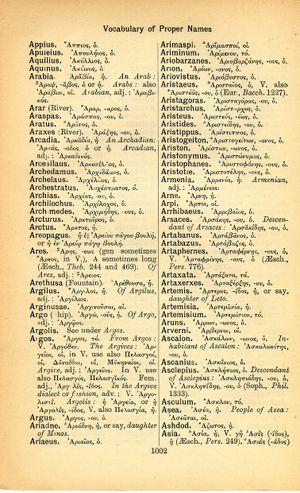Appius: Difference between revisions
Τὸ γὰρ θανεῖν οὐκ αἰσχρόν, ἀλλ' αἰσχρῶς θανεῖν → Mors ipsa non est foeda, sed foede mori → Das Sterben bringt nicht Schmach, doch sterben in der Schmach
(D_1) |
(Gf-D_1) |
||
| Line 1: | Line 1: | ||
{{WoodhouseENELnames | {{WoodhouseENELnames | ||
|Text=[[File:woodhouse_1002.jpg|thumb|link= | |Text=[[File:woodhouse_1002.jpg|thumb | ||
|link={{filepath:woodhouse_1002.jpg}}]]Ἄππιος, ὁ. | |||
}} | }} | ||
{{Lewis | {{Lewis | ||
Revision as of 07:24, 14 August 2017
English > Greek (Woodhouse)
Ἄππιος, ὁ.
Latin > English (Lewis & Short)
Appĭus: ii, m., and Appĭa, ae, f. (abbrev. App.).
I A Roman prœnomen, esp. of persons of the gens Claudia; hence,
II Appĭus, a, um, adj., Appian.
A Appia via, the Appian Way, a well-known high - road, begun by the censor Appius Claudius Cœcus (about 442 A. U. C.), which began in Rome at the Porta Capena, and passed in a direct line to the Albanian Mountains, and thence through the Pontine Marshes to Capua; later it was continued to Brundisium, perh. by Trajan (the stones were large polygons of basaltic lava; parts here and there are yet in existence), Cic. Imp. Pomp. 18, 55; id. Mil. 6, 15; id. ad Q. Fr. 1, 1, 6; id. Phil. 7, 1, 1; Liv. 9, 29, 6; Front. Aquaed. 5; Inscr. Orell. 131; cf. Müll. Roms Camp. 2, 230.—Called also Appī via, Hor. Ep. 1, 6, 26; and simply Appia, id. Epod. 4, 14, al.; Cic. Att. 2, 12.—
B Appia aqua, the aqueduct which this same Appius constructed; Front. Aquaed. 5; cf. Liv. 9, 29. —
C Appii Forum, a small market-town in Latium, founded by the same Appius, on the left side of the Via Appia, in the midst of the Pontine Marshes, now Foro Appio, Hor. S. 1, 5, 3; Vulg. Act. 28, 15; cf. Mann. Ital. I. 637 and 638.
Latin > French (Gaffiot 2016)
Appĭus,⁸ ĭī, m., prénom romain, surtout dans la gens Claudia ; v. Appia via.

